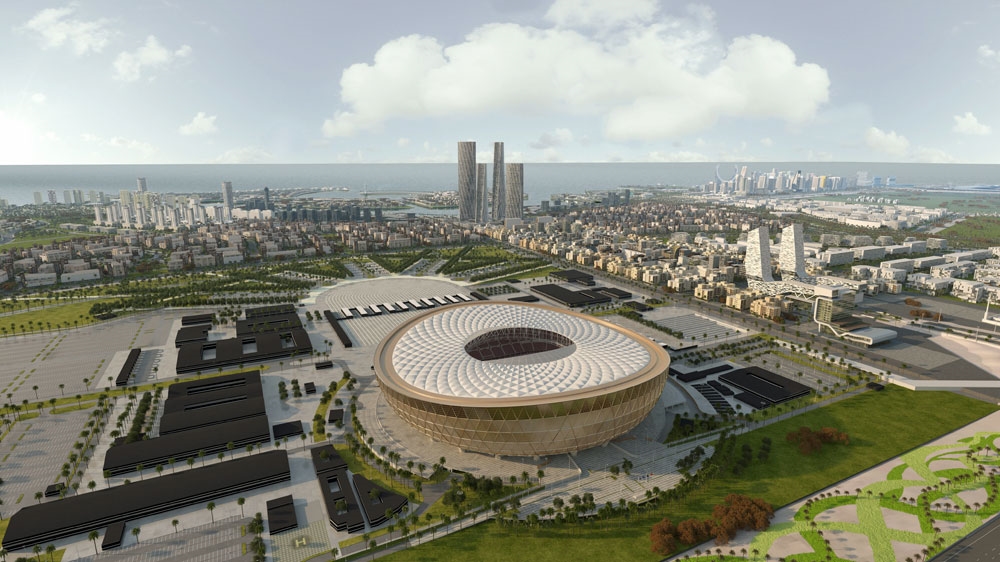
Officials in Qatar revealed the design for Lusail Stadium, the venue at which the opening and final games of the 2022 FIFA World Cup will take place.
The 80,000-capacity venue will be the largest stadium of the tournament, which will kick off on November 21, 2022, and be the first to take place in the Arab world.
Located 15km north of central Doha, the stadium will form the centrepiece of Lusail City, the construction of which is about 90 percent completed, according to the Supreme Committee for Delivery and Legacy (SC), the body tasked with getting Qatar ready to host the World Cup.
Designed by British firm Foster + Partners, the venue’s golden facade takes its inspiration from Arab architecture and the region’s tradition of craftsmanship.
 |
| The stadium is located in Lusail, 15km north of Doha’s city centre [Supreme Committee for Delivery and Legacy] |
Construction of the stadium, which is being delivered by a joint venture of Qatari firm HBK Contracting Company and China Railway Construction Corporation, is well under way.
With the substructure complete, concrete superstructure and infrastructure works are progressing in all seating zones, while internal works have commenced in the west stand.
Construction of the stadium is set to be completed in 2020.
The venue is the eighth stadium design unveiled by the SC. Khalifa International Stadium became the first tournament-ready venue in 2017, while two more stadiums will be completed early next year – Al Wakrah Stadium and Al Bayt Stadium – Al Khor City.
“It has now been eight years since we won the rights to host the 2022 FIFA World Cup and we told the world to expect amazing. With this stunning design of our showpiece stadium, I am proud today to once again be delivering on that promise,” SC Secretary-General Hassan al-Thawadi, said, commenting on the design launch.
“The new stadium is a nod to our past and a symbol of an exciting future. On the very same land as the home of our nation’s founder, it sits at the heart of a brand new city,” al-Thawadi added.
At a later news conference, Al-Thawadi said the total cost of building the stadiums was about $7bn and that spectators for the 2022 World Cup would be between 1.2 to 1.7 million.
The executive stressed that a decision to expand the World Cup from 32 to 48 teams would be taken after a feasibility study is completed in March.
Asked about how the blockade affected Qatar’s preparations for the World Cup, Al-Thawaid said: “At first we did get a little bit affected, of course. It only took us two or three weeks during which we sought alternative plans and looked for new suppliers. It was in our advantage. We found new contractors and now we get more quality materials at competitive prices. The blockade, of course, isn’t a good thing by nature, but [our] work was not affected.”
 |
| Lusail Stadium’s exterior takes its inspiration from traditional Gulf craftsmanship [Supreme Committee for Delivery and Legacy] |
After the 2022 FIFA World Cup, Lusail Stadium will be transformed into a community space, including schools, shops, cafes, sports facilities and health clinics, the SC said. To make way for these amenities, many of the stadium’s modular seats will be removed and donated to sporting projects around the world.
International scrutiny
Beating bid rivals Australia, Japan, South Korea and the United States, Qatar won the hosting rights in 2010, which put the Gulf state under increasing scrutiny over the treatment of migrant workers.
To date, there have been three work-related fatalities and nine non-work related deaths of workers engaged in the construction of Qatar’s World Cup stadiums, according to the tournament organisers.
But the United Nations International Labour Organization dismissed all complaints lodged against Qatar following a new draft bill that introduced a minimum wage and legal protection for the foreign workforce, approved by the government last year.
At least 26,000 people are directly involved in the construction of the proposed stadiums.
Contractors involved in the World Cup projects have agreed to reimburse more than $14.4m to the thousands of workers who had paid recruitment fees before moving to Qatar.
 |
| [Supreme Committee for Delivery and Legacy>] |












